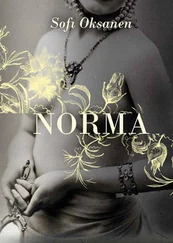The building was full of people, although it was after seven o’clock. The ceaseless tapping of a typewriter echoed from somewhere in the building. Hurried, fervent footsteps came and went. Black leather coattails hummed by in her peripheral vision. Doors opened and closed. Storms of drunken laughter. A young girl’s giggle. A slightly older woman taking off her overshoes in the corridor, cute, decorative little high-heeled shoes emerging from her galoshes. The woman shook her head to straighten her curls, her earrings glinting in the dim light like a sword pulled from its scabbard.
Are you sure, Comrade Aliide?
The corridor smelled like metal.
Someone shouted, “Lenin, Lenin, and once again Lenin!”
The cracks in the pale-colored walls were hazy, as if they were moving. The smell of liquor met her coldly at the door to Martin’s office. Cigarette smoke darkened the room so that she couldn’t see clearly. “Sit down.”
Aliide located Martin by his voice, standing in a corner of the room. He was wiping his hands on a towel as if he had just washed them. Aliide sat in the chair he offered her, sweat squelched under her arms, and she rubbed her upper lip with the dry palm of her hand. As Martin came up beside her and bent to kiss her forehead, his hand took hold of her breast and squeezed it lightly. The wool fabric of his coat scraped against her ear. A damp place was left on her forehead. “There’s something my little mushroom should see.”
Aliide wiped her upper lip again and wrapped her ankles around the chair legs.
Martin let go of her breast, pulled his breath away from her ear, and fetched some papers from the table. He handed one of them to Aliide-her hands were reluctant under its weight. She stared straight ahead. Martin was standing beside her. The paper dropped into her lap, and her thighs started to burn under it, although the continuing chill had made her skin numb and turned her fingertips white. Martin’s breath moved through the room like a breeze. Aliide’s mouth filled with spit, but she didn’t dare swallow. Swallowing would betray her nervousness.
“Look at it.”
Aliide let her gaze settle on the paper.
It was a list. There were names on the list.
“Read through them.”
He didn’t stop watching her.
She started to arrange the letters into words.
She found Ingel’s and Linda’s names in the first row.
Her eyes halted. Martin noticed it.
“They’re leaving.”
“When?”
“The date’s at the top of the page.”
“Why are you showing me this?”
“Because I don’t keep any secrets from my little mushroom.”
Martin’s mouth spread into a smile; his eyes shone brightly. He lifted his hand to her neck and caressed it.
“What a beautiful neck my little mushroom has, slender and graceful.”
When Aliide left the town hall, she stopped to say hello to a man smoking in the doorway. He said it was a peculiar spring. “Awfully early. Don’t you think?”
Aliide nodded and slinked away to smoke her own cigarette behind a tree, so she herself wouldn’t seem to be peculiar, smoking in public. A peculiar spring. Peculiar springs and peculiar winters were always frightening. Nineteen forty-one was a peculiar winter, terribly cold. Also 1939 and 1940. Peculiar years, peculiar seasons. There was a buzzing in her head. So here it was again. A peculiar season. A repetition of the peculiar years. Her father had been right- peculiar seasons bode peculiar events. She should have known. Aliide tried to clear her head by shaking it. This was no time for the old folks’ stories, because they didn’t say anything about how to behave when a peculiar season came along. Just pack your bags and prepare for the worst.
It was clear that Martin wanted to test her, test her trustworthiness. If Ingel and Linda escaped now or if they weren’t at home on the night in question, Martin would know who was responsible. The ache in Aliide’s teeth intensified and moved to her jaws.
Ingel and Linda were going to be taken away. Not Aliide. And not Hans. She had to think clearly, think clearly about Hans. She would have to demand that Martin arrange for them to move into Ingel’s house after she had been taken away; no other house would do for Aliide. Not a finer one or a larger one or a smaller one-no other house would do. Aliide would have to be on fire for the next few days, blooming, making Martin dizzy on their mattress at night, so that he would do everything he could to arrange to get that house for them. And the animals should stay with the house! She didn’t want anyone else’s animals. Maasi was her cow! If she found the barn empty, Martin would set his men after the thieves and send them all to Siberia! She marveled at the fury that blazed up the moment she thought of someone else touching her animals. Because they were hers now -Ingel was just milking the cows for a little while longer. They ought to take one cow over to the barn at the collective farm, so they could stay within the quota. But Martin could arrange to get it back later. Anyway, no one would come to count the animals in a party organizer’s barn.
But in the beginning Aliide didn’t want to think about the most essential question: How would Hans stay hidden with Martin sleeping under the same roof? Hans wasn’t a snorer, but what if he started snoring? Or sneezed in the middle of the night? What if he had a cough? Hans knew how to be quiet when guests were visiting, it’s true, but what about when Martin was actually living in the same house? Talking about Great-Grandma haunting the place wouldn’t work on Martin. Aliide pressed her hands to her forehead and cheeks. How long had she been standing there? She started moving her feet toward home. She tasted blood in her mouth. She had bitten her cheek. The attic. She had to get Hans into the attic. Or a cellar. She would have to build a cellar under the pantry or the little spare room. Or was the attic better? The attic extended from the house over the barn and the stable, and above the barn and stable it was full of hay, the bales packed so tightly that it would be impossible to investigate. If a closet were built there, no one would ever notice it. It could be built behind the hay bales. Above the barn. Since Aliide would be feeding the cows, she could be in the barn all the time to drop the hay from the trapdoor to the cows below. Martin would probably never even set foot in the barn-he didn’t know how to milk, and he didn’t like chickens, either, because they had almost pecked his eye out when he was a child, and a cow had trod on his foot and crushed it. No wonder Martin had decided to become an agitator-he never would have managed with the animals. Anyway, the animals would make noise. Hans could sneeze and cough all he wanted. And the rafters above the barn were thicker, too; there were thirty centimeters of sand between the planks. No one would hear anything.
As soon as Ingel and Linda had been taken away she would build a room-she could do it by herself. There were boards ready in the attic scrap heap. Then just put the hay in front of it. She could use bales that were easy to move but wouldn’t attract anyone’s notice-even if someone went all the way up to the attic.
When Aliide went to visit Ingel, sometimes she watched her closely and at other times couldn’t bring herself to even glance in her direction. After that first night in the town hall, Aliide had made an effort to avoid her gaze, just as her sister had avoided Aliide’s gaze, but after seeing the list Aliide felt a compulsion to go to Ingel’s house just to look at her. She sometimes crept up on her as she was working-she had an urge to stare at Ingel the way you stare at something fading, something that will never be seen again. She did it in secret, when Ingel was checking on the animals, bringing clover to the cows that were coming into milk, focused on her work.
Читать дальше












